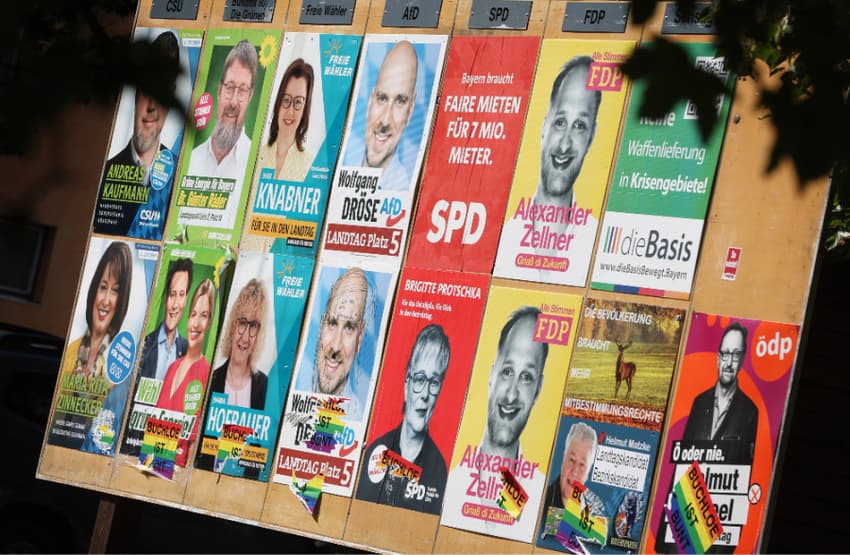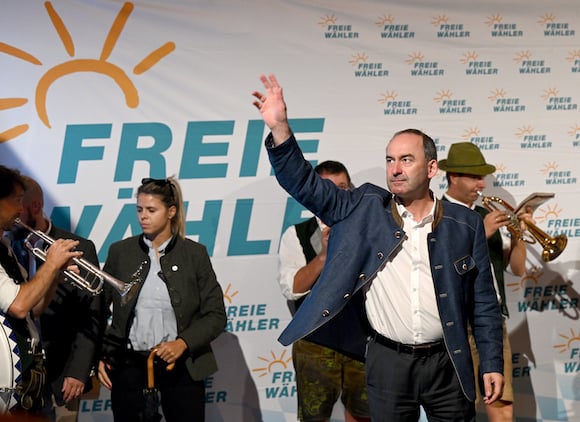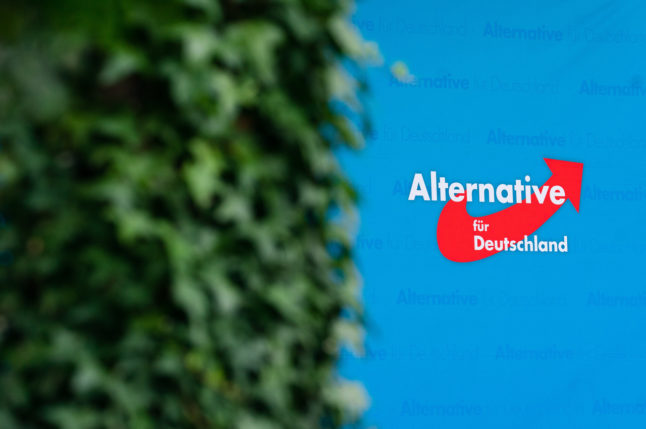What's at stake for international residents in Bavaria's elections?

With state elections coming up on Sunday in Germany’s prosperous southern state, The Local looked at the policies of all the different parties to see what they could mean for international residents.
This upcoming Bavarian election has received a lot of national and international attention. Rather than being about policies or a potential change in government, it has been due to scandalous allegations of anti-Semitism and Holocaust-minimization about the state’s deputy premiere Hubert Aiwanger of the Free Voters (Freie Wähler).
But that's hardly the only issue on the ballot.The Bayerntrend has shown that immigration has taken over energy policy as the most important topic for voters, followed by environment and climate, education and schools, and the economy.
Energy has been a particularly hot topic, with the federal government’s proposal to phase out gas and oil boilers in favour of heat pumps seeing raucous protests in Bavaria.
Söder’s “Bavaria coalition” between the CSU and the Free Voters is also said to be the preferred option for the ruling camp after the election, despite the accusations of anti-Semitism about its leader, but a strong result for the Greens or acrimonious negotiations could convince the CSU to look elsewhere.
READ ALSO: OPINION: Oktoberfest revelry reveals the political storm brewing in Bavaria
Christian Social Union (CSU)
The CSU have governed Bavaria almost uninterrupted since they were founded as the sister party of the Christian Democratic Union (CDU) at the end of the Second World War.

CSU Leader and Bavarian Premier Markus Söder speaking on September 22nd. Photo: picture alliance/dpa | Nicolas Armer
So you shouldn’t expect much change if they get in. And they are almost guaranteed to. Though they are predicted to get the worst vote share in their history in next week’s elections, at 36 percent, it is still practically a foregone conclusion that they will remain the ruling party and their leader Markus Söder will stay on as state premiere. The real question is who exactly they will govern with. Their top campaign points relevant to foreigners call for the following.
-
Allow anyone with a skilled job or in training to stay in Bavaria.
-
Bavaria should delay federally set plans for climate neutrality by five years, until 2050.
-
Create “technology transfer centres” in every district in Bavaria.
-
Reduce electricity tax to the European legal minimum and reduce VAT on all food and drinks.
-
Mandatory language-skills assessment before starting school.
It isn’t up for the Free State to decide but the CSU’s Markus Söder has repeatedly expressed his opposition to the new rules allowing foreigners to get a German passport more easily.
Greens
The Greens went from the party that Söder wanted to ally with to being declared the “main enemy” by the CSU, the Free Voters and the AfD faster than you can say Artenschutzgesetz (species protection act).
“The Greens don’t belong to Bavaria!” shouted Markus Söder at a barnstorming speech recently. But as one of the most pro-migration parties in Germany, polling at 15 percent and governing the state capital of Munich, there are a few million voters who disagree.
-
The Greens want to set up “welcome centers” for labor migration that will support companies in finding suitable international skilled workers. Immigration and integration into the labor market should be simplified, work bans should be abolished and the recognition of qualifications abroad should be improved.
-
Get rid of a strict minimum average grade needed to get into academic high schools (Gymnasium) in Bavaria, reducing the stress on pupils and giving them more time to learn.
-
They want to make Bavaria climate neutral by 2035, ten years ahead of the federal target, and make the Steigerwald Bavaria’s third national park, as well allowing more wind turbines to be built
-
They aim to set up a “transformation fund” of €300 million to support medium-sized businesses with the green transition, while strengthening regional supply chains.
Free Voters
The Free Voters were something of an unknown quality on the German political stage until this summer when leader Hubert Aiwanger was accused of making Hitler salutes and Holocaust jokes at school, while being involved in distributing a pamphlet that offered macabre prizes like “a free trip through Auschwitz’s chimney” to “the greatest traitor to the fatherland.”
READ ALSO: Why a high profile Bavarian politician is embroiled in an anti-Semitic row

Hubert Aiwanger waves from a stage at the Gillamoos folk festival in Lower Bavaria on Septemer 4th 2023. Photo: picture alliance/dpa | Sven Hoppe
Denying the allegations as a left-wing smear campaign, Aiwanger’s Free Voters have actually risen in the polls at the expense of their senior coalition partner.
-
Introduce a Canadian-style points-based system to attract skilled workers to Bavaria, with applicants earning points depending on their qualifications and experience.
-
Faster recognition of foreign educational qualifications and accelerated access to the labor market.
-
Introduce all Bavarian sewage treatment plants with a special filter that cleans microplastics, and support sewage systems that flush toilets with rainwater.
-
Only give state contracts to companies that have negotiated tariffs.
-
The Free Voters want to limit family reunification for asylum seekers, but also rejects deportations during the training period. Any migrates who try to integrate should have the prospect of staying.
-
English should be a compulsory subject in all apprenticeships.
Social Democrats (SPD)
The SPD were the second party in Bavaria for a long time, with their worker-friendly politics playing foil to the agrarian conservative CSU. But now polling at just nine percent, they have largely been replaced by the Greens in the Free State, who have similar policies.
READ ALSO: Why Scholz's coalition is set to take a hit in Germany's state polls
-
The SPD says it wants more people with international backgrounds in political offices, state authorities and management positions in companies.
-
People without a German passport should be given the right to vote in local and state elections from the third year of their stay.
-
Internationals should “receive a work permit more quickly and have their qualifications recognized more easily” by introducing clearer instructions and ending regional approaches.
-
Immigration authorities should no longer be committed to the “principle of isolation” but should be transformed into “welcome authorities”.
-
Strengthen green technology startups by protecting them from takeovers and competition with non-European monopolies.
Alternative for Germany (AfD)
Despite polling steadily at 14 percent, the far-right AfD are very unlikely to enter state government in Bavaria due to the well-established convention in German politics of democratic parties not co-operating with the far-right.
According to Bavarian public broadcaster Bayerische Rundfunk, the party’s manifesto (Wahlprogramm) focuses on national and international issues, without many local policies.

A poster with the logo of the Alternative for Germany (AfD) party is displayed in the town of Abensberg in Bavaria.. Photo: picture alliance/dpa | Nicolas Armer
-
Only allow foreign skilled workers to enter the country for a “limited time”, with strict numerical limits
-
Stop small and medium enterprises from having to issue receipts and follow (EU set) GDPR privacy requirements.
-
Abolish quotas for women and people with international backgrounds in company boardrooms
-
Permanently reduce VAT in food and drinks for the hospitality industry
-
Stop promoting e-mobility in favour of combustion engines
Free Democratic Party (FDP)
In Bavaria there is already a plethora of parties on the centre-right, and the business-friendly FDP have struggled to make themselves heard.
Being in the unpopular Ampel (traffic-light) government may be part of that. Polling at four percent, they currently look unlikely to get into state parliament at all. Nevertheless, some international voters may be interested in their policies.
-
Allow all asylum seekers with “special integration achievements” to stay in Germany.
-
A simplified and digital visa program, with visas to be issued within four weeks.
-
Targeted recruitment programs of skilled workers from abroad.
-
Introduce a “start-up loan” that gives young entrepreneurs up to €1,000 per month for a maximum of one year
-
Allow sales outlets without staff to sell on Sundays.
-
Make working hours more flexible by setting them weekly rather than daily.
-
A legal right to a digital device for every student, to be financed through an education voucher.
Comments
See Also
This upcoming Bavarian election has received a lot of national and international attention. Rather than being about policies or a potential change in government, it has been due to scandalous allegations of anti-Semitism and Holocaust-minimization about the state’s deputy premiere Hubert Aiwanger of the Free Voters (Freie Wähler).
But that's hardly the only issue on the ballot.The Bayerntrend has shown that immigration has taken over energy policy as the most important topic for voters, followed by environment and climate, education and schools, and the economy.
Energy has been a particularly hot topic, with the federal government’s proposal to phase out gas and oil boilers in favour of heat pumps seeing raucous protests in Bavaria.
Söder’s “Bavaria coalition” between the CSU and the Free Voters is also said to be the preferred option for the ruling camp after the election, despite the accusations of anti-Semitism about its leader, but a strong result for the Greens or acrimonious negotiations could convince the CSU to look elsewhere.
READ ALSO: OPINION: Oktoberfest revelry reveals the political storm brewing in Bavaria
Christian Social Union (CSU)
The CSU have governed Bavaria almost uninterrupted since they were founded as the sister party of the Christian Democratic Union (CDU) at the end of the Second World War.

So you shouldn’t expect much change if they get in. And they are almost guaranteed to. Though they are predicted to get the worst vote share in their history in next week’s elections, at 36 percent, it is still practically a foregone conclusion that they will remain the ruling party and their leader Markus Söder will stay on as state premiere. The real question is who exactly they will govern with. Their top campaign points relevant to foreigners call for the following.
-
Allow anyone with a skilled job or in training to stay in Bavaria.
-
Bavaria should delay federally set plans for climate neutrality by five years, until 2050.
-
Create “technology transfer centres” in every district in Bavaria.
-
Reduce electricity tax to the European legal minimum and reduce VAT on all food and drinks.
-
Mandatory language-skills assessment before starting school.
It isn’t up for the Free State to decide but the CSU’s Markus Söder has repeatedly expressed his opposition to the new rules allowing foreigners to get a German passport more easily.
Greens
The Greens went from the party that Söder wanted to ally with to being declared the “main enemy” by the CSU, the Free Voters and the AfD faster than you can say Artenschutzgesetz (species protection act).
“The Greens don’t belong to Bavaria!” shouted Markus Söder at a barnstorming speech recently. But as one of the most pro-migration parties in Germany, polling at 15 percent and governing the state capital of Munich, there are a few million voters who disagree.
-
The Greens want to set up “welcome centers” for labor migration that will support companies in finding suitable international skilled workers. Immigration and integration into the labor market should be simplified, work bans should be abolished and the recognition of qualifications abroad should be improved.
-
Get rid of a strict minimum average grade needed to get into academic high schools (Gymnasium) in Bavaria, reducing the stress on pupils and giving them more time to learn.
-
They want to make Bavaria climate neutral by 2035, ten years ahead of the federal target, and make the Steigerwald Bavaria’s third national park, as well allowing more wind turbines to be built
-
They aim to set up a “transformation fund” of €300 million to support medium-sized businesses with the green transition, while strengthening regional supply chains.
Free Voters
The Free Voters were something of an unknown quality on the German political stage until this summer when leader Hubert Aiwanger was accused of making Hitler salutes and Holocaust jokes at school, while being involved in distributing a pamphlet that offered macabre prizes like “a free trip through Auschwitz’s chimney” to “the greatest traitor to the fatherland.”
READ ALSO: Why a high profile Bavarian politician is embroiled in an anti-Semitic row

Denying the allegations as a left-wing smear campaign, Aiwanger’s Free Voters have actually risen in the polls at the expense of their senior coalition partner.
-
Introduce a Canadian-style points-based system to attract skilled workers to Bavaria, with applicants earning points depending on their qualifications and experience.
-
Faster recognition of foreign educational qualifications and accelerated access to the labor market.
-
Introduce all Bavarian sewage treatment plants with a special filter that cleans microplastics, and support sewage systems that flush toilets with rainwater.
-
Only give state contracts to companies that have negotiated tariffs.
-
The Free Voters want to limit family reunification for asylum seekers, but also rejects deportations during the training period. Any migrates who try to integrate should have the prospect of staying.
-
English should be a compulsory subject in all apprenticeships.
Social Democrats (SPD)
The SPD were the second party in Bavaria for a long time, with their worker-friendly politics playing foil to the agrarian conservative CSU. But now polling at just nine percent, they have largely been replaced by the Greens in the Free State, who have similar policies.
READ ALSO: Why Scholz's coalition is set to take a hit in Germany's state polls
-
The SPD says it wants more people with international backgrounds in political offices, state authorities and management positions in companies.
-
People without a German passport should be given the right to vote in local and state elections from the third year of their stay.
-
Internationals should “receive a work permit more quickly and have their qualifications recognized more easily” by introducing clearer instructions and ending regional approaches.
-
Immigration authorities should no longer be committed to the “principle of isolation” but should be transformed into “welcome authorities”.
-
Strengthen green technology startups by protecting them from takeovers and competition with non-European monopolies.
Alternative for Germany (AfD)
Despite polling steadily at 14 percent, the far-right AfD are very unlikely to enter state government in Bavaria due to the well-established convention in German politics of democratic parties not co-operating with the far-right.
According to Bavarian public broadcaster Bayerische Rundfunk, the party’s manifesto (Wahlprogramm) focuses on national and international issues, without many local policies.

-
Only allow foreign skilled workers to enter the country for a “limited time”, with strict numerical limits
-
Stop small and medium enterprises from having to issue receipts and follow (EU set) GDPR privacy requirements.
-
Abolish quotas for women and people with international backgrounds in company boardrooms
-
Permanently reduce VAT in food and drinks for the hospitality industry
-
Stop promoting e-mobility in favour of combustion engines
Free Democratic Party (FDP)
In Bavaria there is already a plethora of parties on the centre-right, and the business-friendly FDP have struggled to make themselves heard.
Being in the unpopular Ampel (traffic-light) government may be part of that. Polling at four percent, they currently look unlikely to get into state parliament at all. Nevertheless, some international voters may be interested in their policies.
-
Allow all asylum seekers with “special integration achievements” to stay in Germany.
-
A simplified and digital visa program, with visas to be issued within four weeks.
-
Targeted recruitment programs of skilled workers from abroad.
-
Introduce a “start-up loan” that gives young entrepreneurs up to €1,000 per month for a maximum of one year
-
Allow sales outlets without staff to sell on Sundays.
-
Make working hours more flexible by setting them weekly rather than daily.
-
A legal right to a digital device for every student, to be financed through an education voucher.
Join the conversation in our comments section below. Share your own views and experience and if you have a question or suggestion for our journalists then email us at [email protected].
Please keep comments civil, constructive and on topic – and make sure to read our terms of use before getting involved.
Please log in here to leave a comment.